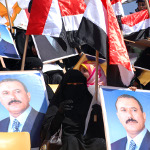Yemen recently celebrated the twentieth anniversary of unification between the Yemen Arab Republic (North Yemen) and the People’s Democratic Republic of Yemen (South Yemen). Unique political conditions created by unification led the country’s decision-makers to introduce universal suffrage to the Arabian Peninsula. Yemen’s 2006 presidential ballot—deemed an “open and genuine contest” by European Union election monitors—raised hopes that after nearly two decades, the country was progressing towards mature participatory politics.
Four years later, Yemen’s democracy is on hold, at least temporarily. Neither constitutional reforms, recommended by the EU election monitors in 2006, nor suggested technical amendments to the election law have yet been implemented. The last round of parliamentary elections, scheduled for April 2009, were delayed for two years by mutual agreement between the ruling party, the General People’s Congress (GPC), and the Joint Meeting Parties (JMP), a coalition of opposition groups. Now Yemen will need to take action within the next two months, or elections planned for April 2011 will not be possible.
Last year’s postponement deal included a commitment to hold bi-partisan dialogue that would seek to break the deadlock over the electoral framework. The outbreak of violent protests in south Yemen a few months later, followed by renewed conflict in the northern province of Saada, however, ruptured the conditions required to establish fruitful talks. The recourse to violence indicated that the grievances of the southern separatists and the Saada rebels—the so-called “non parties”—were beyond resolution by the existing parliamentary system. In response to these rising tensions, President Ali Abdullah Saleh promised to sponsor a wide-ranging national dialogue, but as yet these talks remain elusive.
Instead, the JMP has gone ahead with an independent national consultation exercise to canvass grassroots opinions and determine an alternative vision for the future of the country. The resulting national salvation plan calls for “leverage for peaceful change” to relieve the country from “despotism and corruption.” Supporters count the JMP’s initiative as a sign that the opposition is transforming itself from an urban phenomenon into a credible national political movement. Many Yemenis still believe, however, that parliamentary politics are hostage to elite self-interest and that key protagonists in both parties are bringing the system to its knees by pushing for their own advantage.
Cross-party negotiators continue their efforts to set the parameters for national dialogue, but both power blocs are repeatedly criticized, for stalling. The JMP can resort to the threat of boycott in next year’s elections, while the GPC is blamed for playing with time to maintain the balance of power in parliament. When talks reached stalemate in April, unknown gunmen opened fire on the JMP’s chief negotiator. A week later, President Ali Abdullah Saleh announced that delayed parliamentary elections would be held on schedule in April 2011, regardless of the status of negotiations. During unity celebrations in May, however, Saleh offered an amnesty deal for the release of political prisoners and called for a coalition government.
After thirty years at the top, President Ali Abdullah Saleh is beset with challenges including falling oil production, a currency that is rapidly dropping in value, complaints about the concentration of power, and a popular backlash against civilian deaths in missiles strikes that are intended to target al-Qaeda’s leadership. Opposition leaders might well fear that they have little to gain and much to lose by joining a coalition cabinet. But they will also share the blame for derailing Yemeni democracy if they fail to negotiate a timely agreement to hold next year’s elections or decide to boycott the ballot.
Yemen’s upcoming elections pose various hard choices and possible dilemmas for Western donors. Should the European Union deploy election monitors if its 2006 recommendations for constitutional reforms remain ignored? If it does, how will the EU guarantee the security of its observers? And what if observers judge the result to be unfair? Without Yemen gaining a clean bill of electoral health, donors will be even further constrained in their relationship with the Yemeni government and the gap between rhetoric and reality on democracy and governance reforms will grow even wider. A controversial election result has the potential to stretch a coordinated donor stance to the limit.
Yemenis themselves are divided over the significance of the planned elections. Opposition figures argue that political reforms are an essential precondition for effective measures to tackle the macro-economic challenges. Yet within Yemen’s administration, there are some who claim that the country cannot afford the luxury of elections while there is such a pressing need to tackle the escalating economic crisis. And among Yemen’s political class, there are figures who say that flawed elections would be worse than no elections at all because of the risk that voters will lose faith in the political process completely and be further disposed toward violence.
Decisions taken in the coming weeks will determine the direction of Yemen’s shaky political trajectory. Ramadan begins in mid-August and by Eid al-Fitr on September 9, an agreement between the two parties must be in place to implement technical reforms and begin the process of registering voters in sufficient time for the 2011 poll. As each week goes by, ambitious suggestions such as a shift to proportional representation, seem ever more elusive.
“If we have not reached an agreement by September, we can say goodbye to democracy in Yemen,” says former Prime Minister Dr Abdul-Kareem al-Iryani. “The president himself is the only person who can break the deadlock now but if he leaves it to the eleventh hour to strike a deal, there will be no time to implement the agreement.” He adds: “If we cannot guarantee free and fair elections next year, we will not see democracy in my lifetime and a light will go out in the region.”
Ginny Hill is an associate fellow at Chatham House in London, where she runs the Yemen Forum.






